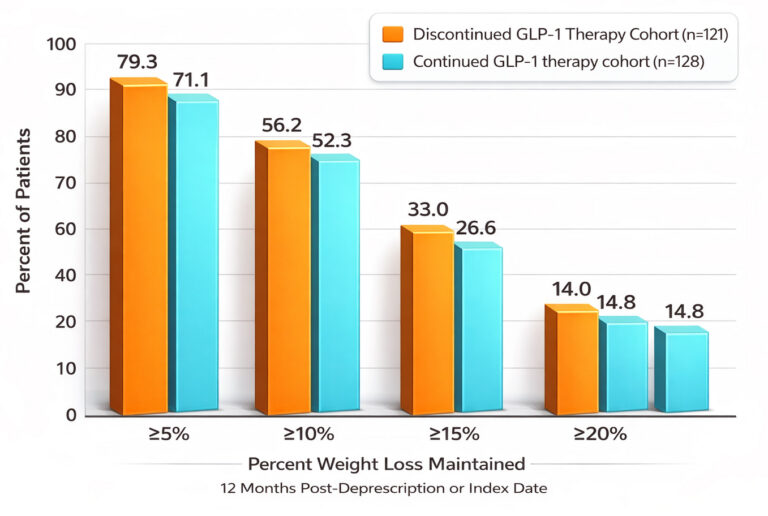GLP-1 receptor agonists such as Ozempic, Wegovy, and Mounjaro are increasingly prescribed for obesity and type 2 diabetes due to their proven effectiveness in reducing appetite, promoting weight loss, and lowering blood glucose levels.(1, 2) These medications have become extremely popular, fueled by extensive marketing to both healthcare providers and the public. However, a major challenge with their use is weight regain after discontinuation.(3, 4)
Could a ketogenic diet help counteract this effect? Research suggests that it can.
Weight Regain: A Common Challenge
Studies show that discontinuing GLP-1 agonists frequently leads to weight regain and a return of cardiometabolic issues that improved while on the medication.(3, 4) An analysis of 327 individuals who used GLP-1 medication for 68 weeks found that after stopping the treatment, they regained approximately two-thirds of the weight they had initially lost. Their metabolic health markers, such as blood sugar and cholesterol, also returned to levels similar to those before treatment.(3)
Another drawback to taking GLP-1 medications is that while they promote weight loss, recently published research shows that approximately 15% to 60% of the loss comes from lean mass.(5, 6) This is very concerning, because preserving muscle mass is crucial for maintaining metabolic rate, overall health, and functionality as we age.(7)
The Potential Solution: A Ketogenic Lifestyle
A paper by researchers at Virta Health, published in February 2024, suggests that a ketogenic diet may help people maintain their weight loss after transitioning off GLP-1 medications.(8) The study compared two groups of type 2 diabetes patients following a ketogenic diet: one group continued GLP-1 therapy, and the other group stopped the medication. Over 12 months, both groups avoided regaining the weight they had lost.
The findings are encouraging:
- Over 70% of patients who discontinued GLP-1 therapy maintained at least a 5% reduction in body weight after 12 months, and more than half maintained a loss of at least 10%. These outcomes were comparable to — and in some cases slightly better than — those observed in patients who continued using GLP-1 medications.
- The patients who discontinued GLP-1 medication also sustained improvements in glycemic control, with hemoglobin A1c levels remaining below the threshold for diabetes.

Why It Works
By focusing on very low carbohydrate intake, high fat consumption, and achieving ketosis, a ketogenic approach can reduce hunger and enhance satiety.(9, 10) This aligns with the appetite-suppressing effects of GLP-1 medications, offering a natural and potentially more sustainable alternative. Moreover, robust evidence supports the use of ketogenic diets for managing weight and metabolic syndrome.(11) When properly formulated with adequate protein and essential nutrients, this approach can be safely maintained long term. Finally, in contrast to the lean mass loss that occurs with GLP-1 medications, ketogenic diets have been shown to help preserve muscle mass during weight loss.(12)
Keeping the Weight Off with Keto After Stopping GLP-1 Medication
Although GLP-1 medications are effective for weight loss, their high cost and risks of significant muscle loss and weight regain emphasize the need for alternative approaches. Adopting a ketogenic lifestyle after discontinuing these medications offers a sustainable strategy for maintaining weight loss and supporting metabolic health.
If you’re considering this approach, it’s important to work with your healthcare provider to ensure a safe, effective transition. The bottom line is that long-term weight loss is achievable without the need for lifelong medication.
REFERENCES
- Once-Weekly Semaglutide in Adults with Overweight or Obesity, New England Journal of Medicine, 2021
- Efficacy and safety of a novel dual GIP and GLP-1 receptor agonist tirzepatide in patients with type 2 diabetes (SURPASS-1): a double-blind, randomised, phase 3 trial The Lancet, 2021
- Weight regain and cardiometabolic effects after withdrawal of semaglutide: The STEP 1 trial extension, Diabetes, Obesity & Metabolism, 2022
- Effect of Continued Weekly Subcutaneous Semaglutide vs Placebo on Weight Loss Maintenance in Adults With Overweight or Obesity: The STEP 4 Randomized Clinical Trial, JAMA, 2021
- Changes in lean body mass with glucagon-like peptide-1-based therapies and mitigation strategies, Diabetes, Obesity and Metabolism, 2024
- Skeletal muscle loss and sarcopenia in obesity pharmacotherapy, Nature Reviews Endocrinology, 2024
- “Maintaining Muscle Function Across the Lifespan: The State of Science,” American Journal of Physical Medicine & Rehabilitation, 2020
- Impact of Glucagon-Like Peptide 1 Agonist Deprescription in Type 2 Diabetes in a Real-World Setting: A Propensity Score Matched Cohort Study, Diabetes Therapy, 2024
- Ketogenic diets and appetite regulation, Current Opinion in Clinical Nutrition & Metabolic Care, 2021
- Association Between Ketosis and Changes in Appetite Markers with Weight Loss Following a Very Low-Energy Diet, Obesity, 2020
- Ketogenic Diet Benefits to Weight Loss, Glycemic Control, and Lipid Profiles in Overweight Patients with Type 2 Diabetes Mellitus: A Meta-Analysis of Randomized Controlled Trials, International Journal of Environmental Research and Public Health, 2022
- Impact of the ketogenic diet on body fat, muscle mass, and exercise performance: a review, Physical Activity and Nutrition, 2023
This blog is provided for informational purposes only and should not be considered a replacement for professional medical advice, diagnosis, or treatment. If you have any questions about a health condition or concerns related to your well-being, always consult with your physician or another qualified healthcare professional.

 Franziska Spritzler, RD, CDE
Franziska Spritzler, RD, CDE

